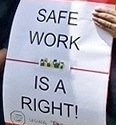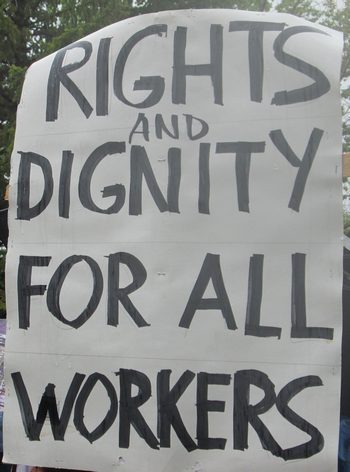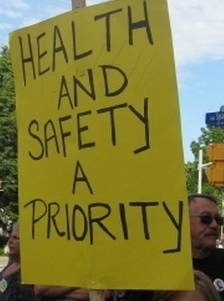|
May 21, 2021 - No. 47
Four Workers Die of COVID-19 in Alberta Oil Sands
Unacceptable COVID-19 Outbreaks
in Oil Sands Workplaces
- Peggy Morton -
  
• Oil Sands Workers Speak Out About Their Conditions
Four Workers Die of COVID-19 in Alberta Oil Sands
- Peggy Morton -
The Wood Buffalo region in Alberta where Fort
McMurray is located has been overwhelmed by a rapid spike in the number
of people infected with COVID-19. Three workers have died in the largest
outbreak, at the Canadian Natural Resources Ltd. (CNRL) mine and
upgrader 70 kms. north of Fort McMurray. A security
guard at the Suncor base plant has also died after contracting
COVID-19. Workers' Forum
extends its deepest sympathy to the families, friends and co-workers of
those who died, and those fighting for their lives, none of whom have
been identified by name.
 CNRL and other oil sands mines and in-situ extraction sites have
had outbreaks for many months. Cases began to surge in April after the
regular maintenance period known as shutdowns or turnarounds began. The
turnaround at CNRL alone involved a peak workforce of 5,000 workers
above the normal daily average. It has recently become
public that 258 workers tested positive between October 2020 and May 1, and
1,169 workers tested positive between April 2 and May 13, with 447 cases
remaining active as of May 13. CNRL and other oil sands mines and in-situ extraction sites have
had outbreaks for many months. Cases began to surge in April after the
regular maintenance period known as shutdowns or turnarounds began. The
turnaround at CNRL alone involved a peak workforce of 5,000 workers
above the normal daily average. It has recently become
public that 258 workers tested positive between October 2020 and May 1, and
1,169 workers tested positive between April 2 and May 13, with 447 cases
remaining active as of May 13.
CNRL is also contending with outbreaks at its Jackfish and Albian
sites. There are also outbreaks at Imperial Oil Kearl Lake, MEG Energy
Conklin site, Suncor Firebag, Fort Hills and Mackay River, and Syncrude
Aurora and Mildred Lake sites.
The Alberta government and health authorities have deliberately
suppressed information about the outbreaks. This was possible in part
because workers who commute are included in case counts in their home
cities or regions, so the real impact of the outbreaks in the camps and
work sites is hidden. The majority of the 10,000 workers now
involved in maintenance turnarounds come from outside the Wood Buffalo
area. Large numbers of oil sands workers also commute, and some sites
are strictly fly-in/fly-out where all workers commute, working 14 days
of 12 hour shifts and returning home for 14 days.
Alberta Health Services (AHS) has not been on the CNRL Horizon site
since March
despite the crisis, instead reporting that "regular
contact with the site continues." Alberta Occupational Health and
Safety is completely silent. CNRL has responded to workers' reports of
lack of sanitary measures and proper treatment for workers who are in
quarantine or need medical treatment
by saying it is taking all necessary measures. Alberta Health
Services has continued its
"hands off" approach, allowing CNRL and other oil sands monopolies to
"self-monitor." The same approach was taken with Cargill last
year, which was
followed by a massive outbreak there, subsequent large outbreaks
at other Alberta meat packing plants and now the oil sands. Production
workers at CNRL are not unionized. Workers involved in the turnarounds
come from different trades not only from Alberta but across Canada and
Quebec.
 When last on site at Horizon in March, AHS noted that there was a
need for such basic measures as sufficient hand sanitizer, further
controls to allow physical distancing and additional cleaning supplies
to be available in trailers. When last on site at Horizon in March, AHS noted that there was a
need for such basic measures as sufficient hand sanitizer, further
controls to allow physical distancing and additional cleaning supplies
to be available in trailers.
AHS also states that it has provided the oil sands companies with a
large number of rapid tests, and is now offering onsite immunization
clinics at industrial camps and sites in Wood Buffalo, with CNRL
Horizon the first site completed, according to an email sent to Global
News. "More than 136,000 rapid tests have been provided to CNRL for its
two sites to help detect COVID-19 and protect workers," AHS stated.
The failure of the government and health agencies to uphold their
social responsibility to the workers and their communities has exposed
the extent to which the government considers the workers in the
industries it has deemed essential as "expendable." Workers and others
are speaking out against the callous disregard by the operators and the
government of their health and that of their families and communities. 
Living quarters at an oil sands work camp
North of Fort McMurray. (Narwhal)

Workers at Canadian Natural Resources Ltd. (CNRL), both workers performing
turnaround maintenance and production workers, together
with their families, are speaking out about their dangerous and
unacceptable working and living conditions which put them at high risk.
By smashing the silence, the fraud presented by the companies, the
government and Alberta Health Services gets exposed. If the workers do
not speak out, governments get away with the way in which they protect
the monopolies and the crimes they are committing at the expense
of Canada's workers, social and natural environment.
 Alberta Health Services (AHS) has not been at the CNRL Horizon site
since March. Workers report that the conditions now are the same or
worse than those identified by AHS in March. These include
inadequate physical distancing, overcrowded lunchrooms, washroom
facilities shared by as many as 50 workers which makes sanitizing
impossible, and crowded buses from
the camp to the worksite. Alberta Health Services (AHS) has not been at the CNRL Horizon site
since March. Workers report that the conditions now are the same or
worse than those identified by AHS in March. These include
inadequate physical distancing, overcrowded lunchrooms, washroom
facilities shared by as many as 50 workers which makes sanitizing
impossible, and crowded buses from
the camp to the worksite.
"In the washrooms, we don't even have hand sanitizer," a worker told
CBC. "I am sharing my washroom and shower with someone who has COVID,
and every week I have been in a lunchroom with 36 people and 34 of them
had tested positive for COVID."
The workers point out that weekly testing is in no way sufficient in the face of this kind of outbreak. As well, workers told Workers' Forum
that while CNRL was responsible for contact tracing, neither CNRL
nor AHS had provided the necessary human resources to carry out contact
tracing, and that workers were being told that they had been in close
contact with an infected person when the necessary quarantine
period was almost over.
Workers are speaking about how they were treated when they became
sick, left alone in closet-like rooms in the "isolation floors" of the
camp, without proper medical care or food and without pay. Some infected workers have also been shuttled to hotels.
The wife of a worker now in an Edmonton ICU told Global News that
her husband tested positive on April 23, about a month after arriving
at the CNRL Horizon site in late March for the turnaround. "This job
was important to our family as COVID-19 resulted in my husband's place
of work being shut down over a year ago," she
explained. After testing positive he remained in camp as he was on a 12
day work and 2 day off rotation, soon began experiencing symptoms and
then became very ill. During an entire week in isolation he received no
medical attention. When, at his family's urging, he called for
help, he was assessed by a paramedic, immediately taken to hospital
in Fort McMurray and is now in an Edmonton ICU where his condition
remains serious.
Workers are speaking out about how they don't feel safe but keep
working because they need the work, and the "turnaround" season is a
major source of work for many of the trades. For these global oligarchs
and the governments which serve them to treat the workers, whose hard
work creates the wealth, as expendable is intolerable and should
be treated for what it is, criminal negligence. When they speak out,
discussion develops and the workers contribute to smashing the norm
imposed on them that this situation is acceptable. Employers must be
made to take responsibility for workers who get sick as a result of the
workplace and governments must be made to take responsibility for the
actions of the employers. Workers are not expendable. They must be paid
when sick or unemployed through no fault of their own. Our security
lies in fighting for the lives of all! Fighting for the lives of all is
a matter of fighting for the rights of all! 
(To access articles individually click on the black headline.)
PDF
PREVIOUS
ISSUES | HOME
Website: www.cpcml.ca
Email: office@cpcml.ca
|

